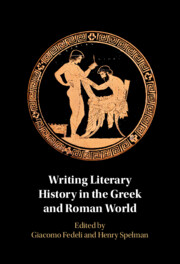Book contents
- Writing Literary History in the Greek and Roman World
- Writing Literary History in the Greek and Roman World
- Copyright page
- Contents
- Contributors
- Introduction
- Part I Between Literature and Scholarship
- Part II Lives and Afterlives
- Part III Narratives of Change
- Chapter 10 Aristotelian Teleology in Literary Criticism
- Chapter 11 Progress and Decline in Roman Perspectives on Literary History
- Chapter 12 The Pleasure of the Text?
- Chapter 13 Plutarch and the History of Greek Poetry
- Epilogue
- Afterword
- Bibliography
- Index Locorum
- Index of Subjects
Chapter 10 - Aristotelian Teleology in Literary Criticism
Demetrius, Dionysius and Longinus on the Early History of Literature
from Part III - Narratives of Change
Published online by Cambridge University Press: 07 June 2024
- Writing Literary History in the Greek and Roman World
- Writing Literary History in the Greek and Roman World
- Copyright page
- Contents
- Contributors
- Introduction
- Part I Between Literature and Scholarship
- Part II Lives and Afterlives
- Part III Narratives of Change
- Chapter 10 Aristotelian Teleology in Literary Criticism
- Chapter 11 Progress and Decline in Roman Perspectives on Literary History
- Chapter 12 The Pleasure of the Text?
- Chapter 13 Plutarch and the History of Greek Poetry
- Epilogue
- Afterword
- Bibliography
- Index Locorum
- Index of Subjects
Summary
Aristotle describes the history of poetry (in Poetics 4–5) in terms of a gradual progress, starting from primitive beginnings and concluding with the perfect forms of Attic (classical) drama. Characteristic of this Aristotelian approach to literary history are the notion of gradual progress, the notion of a τέλος, and the suggestion that different historical ideas, authors or genres belong to one coherent process of development. This chapter examines to what extent Aristotle’s approach has informed ancient literary criticism. It is demonstrated that the Aristotelian framework is in different aways adopted by Dionysius of Halicarnassus in his history of early historiograpy (On Thucydides 5–6), and by Demetrius in his history of prose styles (On Style 12–15). Modern histories of (ancient) literature likewise adopt the Aristotelian narrative of progress. The author of On the Sublime, however, contradicts the Aristotelian model: Longinus’ enthusiasm for early authors like Homer, Archilochus and Hecataeus shows that, according to this critic, the history of the sublime is not one of gradual progress from a primitive beginning towards a perfect form in the classical age. Longinus suggests that the sublime was there from the very beginning. The special position of On the Sublime is explained as resulting from a deliberate rejection of Aristotelian principles.
Keywords
- Type
- Chapter
- Information
- Writing Literary History in the Greek and Roman World , pp. 213 - 236Publisher: Cambridge University PressPrint publication year: 2024

